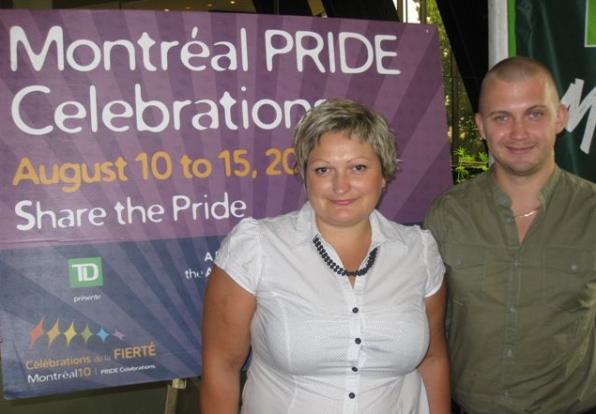I cannot believe — but am also not surprised — that not one Montreal media outlet reported the 20th anniversary of (no, not the Oka Crisis) the single most important and influential gay event in the history of Montreal: the police raid of the Sex Garage loft party on the night of July 15, 1990, in Old Montreal.
In fact, it was only after Xtra reposted my October 2009 column on Sex Garage, widely considered to be Montreal’s Stonewall, on the raid’s 20th anniversary this past July, that the story was picked up by American media such as the popular gay website Towleroad.
But in Montreal? Not a peep!
Sex Garage — named after director Fred Halsted’s 1972 black-and-white porn classic The Sex Garage — forever changed the face of Montreal. In a nutshell, following the brutal police raid on Sex Garage, shocking images of police brutality during peaceful protests over the next two days finally and irrevocably shook three million Montrealers out of their complacency.
Montreal gays and lesbians — French and English — formed the group Lesbians and Gays Against Violence (LGV), precursor of the Table de concertation des gaies et lesbiennes du Grand Montréal, the political-action group pivotal in lobbying for the Quebec Human Rights Commission’s historic 1993 public hearings on violence against gays and lesbians.
La Table was also key in lobbying for the 1999 passage of Quebec’s historic Omnibus Bill 32, which extended benefits, pensions and social services to same-sex couples. That also led to my friend and veteran gay activist Michael Hendricks’ 2004 Quebec Superior Court victory legalizing same-sex marriage in Quebec, a landmark ruling that also forced Ottawa’s hand in the 2005 national debate over same-sex marriage.
Sex Garage also inspired Bad Boy Club Montreal head honcho Robert Vézina to organize the BBCM’s first Black & Blue circuit party in 1991. “We thought everybody needed a breath of fresh air,” Robert told me years later.
And Montreal publicist Puelo Deir produced the outdoor stage show at Montreal’s Parc Lafontaine following LGV’s 1990 march from Montreal City Hall that, in tandem with other Sex Garage fundraisers, helped raise $5,000 to cover lawyers’ fees.
That march also laid the groundwork for Montreal’s Divers/Cité Queer Pride march that Deir co-founded with Suzanne Girard in 1993, a march that in 2007 morphed into this city’s internationally renowned weeklong Divers/Cité queer arts and culture festival.
(Disclosure: I sat on the Divers/Cité board until June 1996 when I began to write my national Three Dollar Bill column based at Montreal’s alt-weekly HOUR magazine.)
Together, over the next decade, Divers/Cité and Black & Blue would transform Montreal into a choice gay tourism destination, pushing Tourisme Montréal to create a gay tourism template since adopted by tourism authorities worldwide.
But in 1990, this was all unfathomable.
Today, Girard is still at the helm of Divers/Cité, which turned 18 this summer. I remember back in 1994, Divers/Cité’s budget was a whopping $42,000. This year it was $1.8 million.
“Community organizers think our budget is huge, but people [in the tourism industry] say we’re small,” Girard says.
Activists can scream about the commercialization and corporatization of Pride and gay festivals like Black & Blue and Divers/Cité all they want, but Girard says there is no such thing as a free lunch. “If you think we’re too commercial, then take the labels off [your] running shoes, caps and iPhones,” Girard says. “Then talk to me about what’s corporate. This is the world we live in.”
And it got tougher still when the Harper Tories this year denied tourism grants to every Pride event in Canada, as well as Divers/Cité which this year had to cut its popular outdoor alt-rock Sex Garage stage (past peformers include The Gossip) and its Flex outdoor show starring Montreal’s famed dance companies.
The BBCM’s Robert Vézina also told me in February that Black & Blue will no longer even bother to apply for federal tourism grants until Harper is voted out of office.
“This [Marquee Tourism Events] Program isn’t about economic stimulus — it’s about blatant, political vote-buying,” charges the Liberal Tourism Critic, MP Navdeep Bains, in a press statement. “They’re taking funding from events where the Conservatives have few votes, like extremely popular [gay] arts festivals that need government help to thrive.”
Then throw in the high cost of security and insurance as well.
“But there will always be Pride [parades],” Girard says. “You need them for the youth. They will always [need to] come out and it’s always hard.”
The Divers/Cité festival organized Montreal’s Pride parade from 1993 until 2006, when it handed over the reins to Célébrations de la Fierté. This year’s fourth annual edition of Célébrations de la Fierté’s Pride parade on August 15 reclaimed Divers/Cité’s old downtown parade route along René-Lévesque Blvd. from Guy to Sanguinet streets.
“Last year we got many emails from young people saying we saved their lives,” says Célébrations de la Fierté president Eric Pineault. “If I can save one life per year, I’ve done my job.”
Girard just wishes Célébrations de la Fierté — which I have happily supported by being one of their parade float jury judges each year — would change their dates (this year August 10-15). “We have two big gay festivals two weeks apart,” Girard says. “Move it! There are other long weekends during the summer. They even originally wanted our dates.”
As for this year’s Grand Marshals, Pineault says, “We met [Baltic Gay Pride organziers] Kaspars Zalitis and Kristine Garina at the [annual] InterPride [world] conference [of Gay Pride organizers] last year and just to see the work they do to help advance gay civil rights in their home country [of Latvia] — we thought they are amazing and were our obvious choice. What they do back home is more than heroic — they put their lives in danger every single day.”
For her part, Kristine Garina was proud to be in Montreal for the city’s Gay Pride parade.
“Pride parades are still important for the [gay liberation] movement, especially in countries like Latvia and other countries less fortunate than Canada where you have the right of assembly,” Garina says. “Some countries can’t do that and they look to you for proof that it is possible. Your Pride parade helps encourage us to continue our own struggle.”
Meanwhile, Divers/Cité and Célébrations de la Fierté may quarrel and Gay Village establishments may diss Girard — who has been a den mother for two generations of gay activists and is one of my personal heroes — but Girard says, “The gay community is a bitching community and we live in Quebec where it’s our motto! We bitch! It’s ingrained in us! Quebecers bitch, and the gays bitch and it’s a double bitch!”
Girard also admits there is growing political pressure from Montreal’s downtown Ville-Marie borough to move Divers/Cité from Parc Emilie-Gamelin (“We turn that hole into a gem every year!”) to the city’s brand-spanking new Place des Spectacles, which now also hosts the city’s jazz, Just For Laughs and FrancoFolies festivals each summer.
So Divers/Cité is striking up a 20th-anniversary committee to organize their 2012 festival. And Girard says Divers/Cité will also bring back their outdoor Sex Garage alt-rock stage, named after the famed Old Montreal loft party and police raid that got the ball rolling 20 years ago.
“I think moving to Place des Spectacles would bring it up a notch, rejuvenate it,” Girard says. “We have some big shows. Can you imagine Mascara or Boulevarde des Rêves there for our 20th anniversary? Le Grand Bal? I would love it! I think it would also bring in a lot of other Montrealers to the festival. More than ever we could live up to our name.”
Moise’s Apples is Richard Burnett’s monthly Xtra.ca column on the history of gay Montreal. Burnett is also Editor-at-Large of Montreal’s Hour magazine, where he writes his national queer-issues column, Three Dollar Bill.


 Why you can trust Xtra
Why you can trust Xtra


